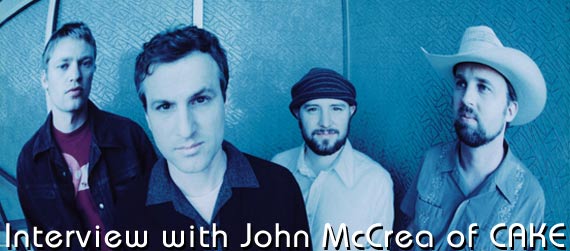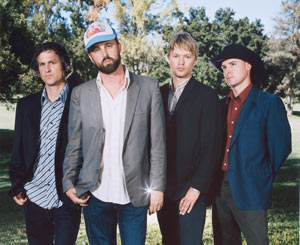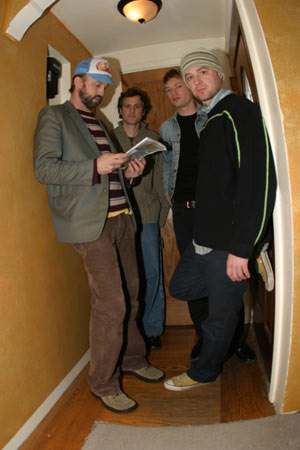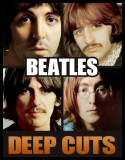
05/24/2007
Music Home / Entertainment Channel / Bullz-Eye Home
John McCrea is the lead singer of CAKE, a group that mixes rock, funk, country, hip-hop and jazz into one gorgeous kaleidoscope of sound. While many of their post-grunge contemporaries have long since hung 'em up, CAKE has kept the pedal down, releasing five albums in the last ten years, with three more on tap in the next year. The newest release, B-Sides and Rarities, is just that - a collection of covers and B-sides that were unable to find homes on the group's previous releases. In the fall, the band will release its first concert disc, Live at the Crystal Palace, and their sixth studio album is expected in early 2008. The always outspoken (and thoughtful) frontman sat down with Bullz-Eye to talk about the band's decision to go indie, the state of the music industry, and what it's like to share a city with the Terminator.
Bullz-Eye: Hello, John?
John McCrea: Yes, hello? How are you?
BE: I'm good. How about you?
JM: I'm very Okay.
BE: Good, I'll dive right in. I hear there's a problem with the scratch and sniff on your new CD, B-Sides and Rarities, what's going on with it?
JM: I don't think there is a problem. We just had some things to figure out. Did someone say there was a problem?
BE: They just said there was a delay on the review copies for that reason.
JM: Oh, yeah. We went through it as fast as we could, but there were a few unexpected surprises, as all surprises are unexpected. There were some things, like the smell of the ink on the cover was sort of overpowering the smell of the scratch and sniff. So we had to figure out a solution for that, but I don't really look at it as a problem. We knew there would be delays.
BE: It has to be the first CD to have a scratch and sniff on it.
JM: I think probably it is.
BE: The new disc has several covers: Frank Sinatra, Black Sabbath and Barry White, just to name a few. You've done a lot of covers in your career. How do you decide on what songs to cover and how does your approach to recording a cover differ from recording your own stuff?
 JM: First of all, a couple of things. It's our premise that there's
nothing weird about doing a cover to begin with, so the way that that
idea sort of gets pounced upon is a little strange to us. I think it's
a result of the singer/songwriter thing from the ‘60s, that somehow
maybe it's sort of a compromise to play a song by somebody else. But
if you buy a country album or a jazz album, or anything that's not
in that rock tradition, it's actually really necessary to play songs
written by other human beings in the world. In a way, it's a less egocentric
aesthetic in these other genres. We sometimes feel more kinship to
those other genres than we do to rock sometimes, in terms of where
we're coming from, you know, philosophically. Regardless, we're sort
of taken aback by how big a deal it is for people when we cover a song
by somebody, especially when we cover a song by somebody in a different
genre. I guess it's upsetting to cross those tribal boundaries. Again,
we think it's weird that it should be a problem because isn't the prime
directive of the song, above and beyond anything else, isn't your highest
fealty to the one song that's playing right now and everything else
is really secondary? It is a visceral thing as well as a cultural thing,
and I think the visceral comes first. The question should not be “Is
that the right genre” or “Is that band cool enough for you to cover?”
The question should be, “Does that song sound like something you would
enjoy playing,” you know? Any of our reasons for playing covers, most
of them come down to the fact that we just sort of feel like playing
that song. We like it and we would enjoy playing it. There's no scheming
on our end.
JM: First of all, a couple of things. It's our premise that there's
nothing weird about doing a cover to begin with, so the way that that
idea sort of gets pounced upon is a little strange to us. I think it's
a result of the singer/songwriter thing from the ‘60s, that somehow
maybe it's sort of a compromise to play a song by somebody else. But
if you buy a country album or a jazz album, or anything that's not
in that rock tradition, it's actually really necessary to play songs
written by other human beings in the world. In a way, it's a less egocentric
aesthetic in these other genres. We sometimes feel more kinship to
those other genres than we do to rock sometimes, in terms of where
we're coming from, you know, philosophically. Regardless, we're sort
of taken aback by how big a deal it is for people when we cover a song
by somebody, especially when we cover a song by somebody in a different
genre. I guess it's upsetting to cross those tribal boundaries. Again,
we think it's weird that it should be a problem because isn't the prime
directive of the song, above and beyond anything else, isn't your highest
fealty to the one song that's playing right now and everything else
is really secondary? It is a visceral thing as well as a cultural thing,
and I think the visceral comes first. The question should not be “Is
that the right genre” or “Is that band cool enough for you to cover?”
The question should be, “Does that song sound like something you would
enjoy playing,” you know? Any of our reasons for playing covers, most
of them come down to the fact that we just sort of feel like playing
that song. We like it and we would enjoy playing it. There's no scheming
on our end.
BE: That “War Pigs” cover rocks. Given the current political climate, was your decision to cover this song a coincidence?
JM: It was not a coincidence that we decided to finish it, but we started recording it before we invaded Iraq. But we knew there would be a war as soon as George Bush was elected in 2000, because if you look at his list of campaign contributors, you can figure out what's going to happen in the next four years. That's a very cynical way of looking at it, but it's almost without exception the case.
BE: Can you talk a little bit about your decision to leave Columbia and go the do-it-yourself route with your own label (Upbeat Records)?
"The idea of making a living from selling musical recordings is sort of a quaint idea and is no longer really feasible." JM: It just doesn't seem like major labels make a lot of sense for bands. The geometry of the situation is just bad. And it took us a while to figure that out. We considered starting our own label way back in 1999 or 2000, and at that point, we just didn't think we had the energy or the sheer heft necessary to adequately compete with these huge labels. So we signed a deal with Columbia and, in retrospect, I don't know if it was a mistake or not. But we sort of felt at odds with the culture of major labels and even at medium sized labels, there's a weird culture – I mean it's weird to us – and not making any value judgments about it, it just wasn't the way we're used to working. We began as a band that did everything ourselves, including managing, producing, mixing, making our own videos, designing our own record covers and just everything. At a record company, every job is specialized; you don't step on other people's toes. It's a corporate type of environment, which wasn't something we were at home with. So anyway, we're happy to get out of that deal and sort of do this ourselves. We're skeptical about our ability to get on TV shows anymore, just because there's a leverage that's used in this business that has to do with relationships and frequency of interaction. We don't really have those, so we'll probably be washed away out to sea in terms of our connectivity to popular culture. But we're fine about it. We can handle it and we're just going to continue doing what we're doing.
BE: It's an exciting time, with the world of music moving more towards a niche society, making it easier to find music that you like. Do you share that view or do you have a gloomier outlook?
 JM: Certainly I see the niche thing happening. It doesn't have to
be the one big song anymore, which is great. I'd still like to see
musicians make a living somehow and I really don't see that as something
that's going to be possible in 10 years, which kind of saddens me as
a musician. And even if I wasn't a musician, it just seems rather unfair
and inconsistent of our culture to sort of rig things so well in favor
of the electronics and computer companies.
JM: Certainly I see the niche thing happening. It doesn't have to
be the one big song anymore, which is great. I'd still like to see
musicians make a living somehow and I really don't see that as something
that's going to be possible in 10 years, which kind of saddens me as
a musician. And even if I wasn't a musician, it just seems rather unfair
and inconsistent of our culture to sort of rig things so well in favor
of the electronics and computer companies.
BE: So are you concerned mostly with piracy?
JM: I think that's a lot of it. The idea of making a living from selling musical recordings is sort of a quaint idea and is no longer really feasible. The sales of recorded music have, every year, been decimated. Over the last seven years it's been like a six or seven percent decrease each year, and this last year it was like 20, so you've got a situation where we're just going to have to play music for fun and it will change what we're willing to put up with, I think, but that's not something that any of us have any control over. But I do think that if music is going to be free, then sandwiches should also be free. There should be some consistency and we should learn to cooperate better.
BE: I think our hope as the audience is that you're getting a bigger percentage of the money that's coming in, since digitally there should be a lower overhead, but is that not the case?
JM: It's a precarious hopeful situation. It's not like you have power over your own ability to put food on your table. You're sort of hoping that the level of honesty and consistency of your listeners is at a level that's high enough for you to be able to pay for your medical bills and things like that.
BE: What's it like sharing a city (Sacramento) with the Governator?
JM: You know, I never run into him. I think that he doesn't go to the same kind of restaurants that I do.
BE: So the city is big enough for the both of you?
JM: Well, yeah. Actually, I think his wife went into the same doctor's office as Vincent DiFiore, our trumpet player, and with security guards and everything. It was like a major spy movie barging into the doctor's office.
BE: You're releasing a live disc in the fall. Did you record a typical CAKE show or did you approach the live disc in a different way?
"But I do think that if music is going to be free, then sandwiches should also be free." JM: Well, it was a strange place to play. It was at the Crystal Palace, which is Buck Owens' venue, before he passed away. When we played he was already getting really sick, but he was a fan and invited us to come and play there. I think we were one of the only non-country acts that he invited to play at his place, so we being pretty big fans of his music played there as many times as we could and decided that Bakersfield was as good a place as any to record a live album. I think it turned out well and the band sounds good on it. We're looking forward to seeing how well it goes over. I'm not a real big fan of live albums, per say. I think in general they're interesting to listen to, but not necessarily viscerally satisfying a lot of the time.
BE: Why is CAKE often written in all caps? Is it really an acronym or do you just like yelling at people?
JM: We just like yelling at people. (laughs) You know what it is? We liked the way the letters look on our flyers. When we first started making our own flyers and putting them on telephone poles it just looked better in all caps.
BE: Well, we're out of time. Thank you.
JM: Thank you so much. Goodbye.








